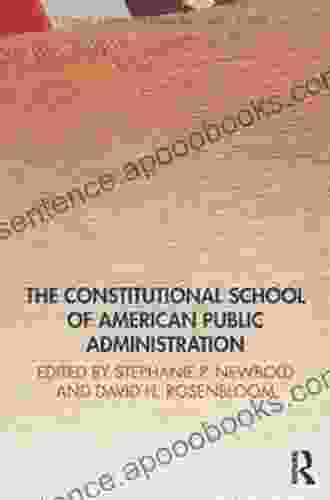Unlocking the Blueprint of American Governance: A Comprehensive Guide to "The Constitutional School of American Public Administration"

In the intricate tapestry of modern governance, the United States stands as a beacon of constitutionalism, with its public administration rooted firmly in the principles laid out by the nation's founding fathers. "The Constitutional School of American Public Administration" offers a comprehensive exploration of this unique approach to governance, providing invaluable insights into the foundations and practices that shape American public administration. Embark on a journey through the pages of this groundbreaking work and discover the intricate workings of a constitutional-based system.
Understanding the Constitutional School
At the heart of the constitutional school lies the belief that public administration is not merely a technical exercise but a political and ethical endeavor. It is predicated on the principles of limited government, individual liberty, and the separation of powers. These principles provide a framework for decision-making, ensuring that the actions of public administrators are consistent with the constitutional principles that govern the nation.
4.5 out of 5
| Language | : | English |
| File size | : | 3502 KB |
| Text-to-Speech | : | Enabled |
| Enhanced typesetting | : | Enabled |
| Word Wise | : | Enabled |
| Print length | : | 335 pages |
| Screen Reader | : | Supported |
The Role of the Constitution
The Constitution of the United States serves as the foundational document for public administration, outlining the powers and responsibilities of government. It establishes the three branches of government (executive, legislative, and judicial) and delineates their functions and relationships. Public administrators must navigate this constitutional landscape, ensuring that their actions are consistent with the principles of limited government and separation of powers.
The Principles of American Public Administration
The constitutional school of American public administration is guided by a set of core principles that shape the behavior and practices of public administrators. These principles include:
- Efficiency: Public administrators strive to maximize efficiency in the use of public resources.
- Effectiveness: Public administrators aim to achieve the desired outcomes and objectives of public policy.
- Accountability: Public administrators are accountable to the public and to the elected officials who appoint them.
- Transparency: Public administrators operate in a transparent manner, providing access to information about their decisions and actions.
- Responsiveness: Public administrators are responsive to the needs and concerns of the public.
The Practices of American Public Administration
The principles of American public administration are manifested in a range of practices that ensure the effective and ethical implementation of public policy. These practices include:
- Policy Analysis: Public administrators conduct rigorous analysis of public policy proposals to assess their feasibility, effectiveness, and potential consequences.
- Budgeting: Public administrators develop and manage budgets that allocate public resources to achieve public policy objectives.
- Human Resource Management: Public administrators recruit, develop, and manage a workforce that is capable of delivering public services effectively.
- Public Relations: Public administrators communicate with the public to inform them about government activities and to provide opportunities for input.
- Ethics and Values: Public administrators adhere to high ethical standards and values, including integrity, impartiality, and respect for the law.
Challenges and Opportunities
The constitutional school of American public administration is not without its challenges. In an era of rapid technological change and globalization, public administrators face new and complex issues that test the limits of traditional principles and practices. However, these challenges also present opportunities for innovation and adaptation. By embracing new ideas and technologies while remaining grounded in constitutional principles, public administrators can continue to fulfill their vital role in American governance.
"The Constitutional School of American Public Administration" is an essential resource for anyone seeking a deeper understanding of American governance. Through a comprehensive examination of the principles, practices, and challenges of public administration, this book provides a roadmap for navigating the complex landscape of constitutionalism in the modern era. By embracing the constitutional school, public administrators can continue to uphold the ideals of limited government, individual liberty, and the separation of powers, ensuring that American public administration remains a model for the world.
4.5 out of 5
| Language | : | English |
| File size | : | 3502 KB |
| Text-to-Speech | : | Enabled |
| Enhanced typesetting | : | Enabled |
| Word Wise | : | Enabled |
| Print length | : | 335 pages |
| Screen Reader | : | Supported |
Do you want to contribute by writing guest posts on this blog?
Please contact us and send us a resume of previous articles that you have written.
 Book
Book Novel
Novel Page
Page Chapter
Chapter Text
Text Story
Story Genre
Genre Reader
Reader Library
Library Paperback
Paperback E-book
E-book Magazine
Magazine Newspaper
Newspaper Paragraph
Paragraph Sentence
Sentence Bookmark
Bookmark Shelf
Shelf Glossary
Glossary Bibliography
Bibliography Foreword
Foreword Preface
Preface Synopsis
Synopsis Annotation
Annotation Footnote
Footnote Manuscript
Manuscript Scroll
Scroll Codex
Codex Tome
Tome Bestseller
Bestseller Classics
Classics Library card
Library card Narrative
Narrative Biography
Biography Autobiography
Autobiography Memoir
Memoir Reference
Reference Encyclopedia
Encyclopedia Rachel Aaron
Rachel Aaron Carolyn Turpin Petrosino
Carolyn Turpin Petrosino Emily Beffrey
Emily Beffrey Elizabeth Fitzelle Nuti
Elizabeth Fitzelle Nuti John J Gschwend Jr
John J Gschwend Jr Ellen Anthony
Ellen Anthony Elizabeth Hartman
Elizabeth Hartman Baby Professor
Baby Professor Ryan D Griffiths
Ryan D Griffiths Denes Agay
Denes Agay Jonathan Morduch
Jonathan Morduch Elizabeth Singler
Elizabeth Singler Daniel Cassidy
Daniel Cassidy Rongbin Han
Rongbin Han Keith Stein
Keith Stein Lionel Shriver
Lionel Shriver Paul R Bruno
Paul R Bruno Elizabeth Tammi
Elizabeth Tammi Ellen Koskoff
Ellen Koskoff Andrew Paquette
Andrew Paquette
Light bulbAdvertise smarter! Our strategic ad space ensures maximum exposure. Reserve your spot today!

 Gene PowellSurveillance Capitalism, Military Contracting, and the Rise of the Security...
Gene PowellSurveillance Capitalism, Military Contracting, and the Rise of the Security...
 Clarence MitchellDive into the Depths of Marine Science: Explore the Latest Advances in Marine...
Clarence MitchellDive into the Depths of Marine Science: Explore the Latest Advances in Marine... Finn CoxFollow ·19.3k
Finn CoxFollow ·19.3k Connor MitchellFollow ·3.7k
Connor MitchellFollow ·3.7k Tony CarterFollow ·16.1k
Tony CarterFollow ·16.1k Rubén DaríoFollow ·5.7k
Rubén DaríoFollow ·5.7k Brian WestFollow ·19k
Brian WestFollow ·19k John UpdikeFollow ·16k
John UpdikeFollow ·16k Howard BlairFollow ·7.4k
Howard BlairFollow ·7.4k W.B. YeatsFollow ·16.2k
W.B. YeatsFollow ·16.2k

 Julian Powell
Julian PowellShetland Pony: Comprehensive Coverage of All Aspects of...
The Shetland...

 Cason Cox
Cason CoxHow Anaesthetics Changed the World: A Medical Revolution...
Imagine a world where surgery is an...

 Harold Powell
Harold PowellUnleash Your Inner Songwriter: The Ultimate Guide for...
Calling all aspiring songwriters!...

 Nikolai Gogol
Nikolai GogolUnleash Your Artistic Potential: Quick Draw Anatomy for...
In the dynamic and visually...

 Tim Reed
Tim ReedThe Rock 'n' Roll Life of Legendary Sax Man Bobby Keys
The Rock 'n' Roll Life...

 Damon Hayes
Damon HayesMoney Management Activities for Youth: A Guide to...
In an era marked by rapidly...
4.5 out of 5
| Language | : | English |
| File size | : | 3502 KB |
| Text-to-Speech | : | Enabled |
| Enhanced typesetting | : | Enabled |
| Word Wise | : | Enabled |
| Print length | : | 335 pages |
| Screen Reader | : | Supported |







